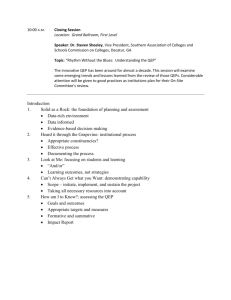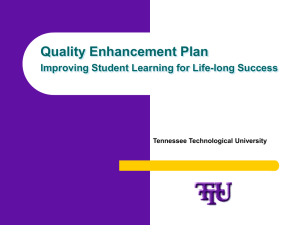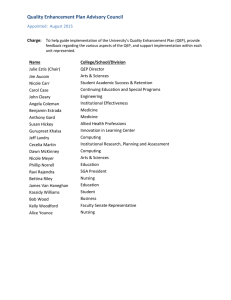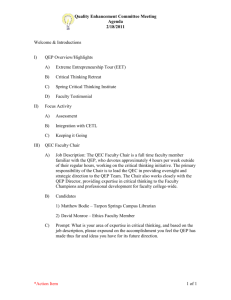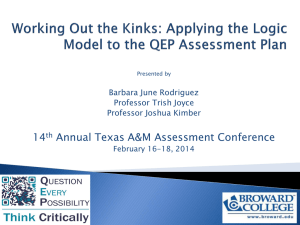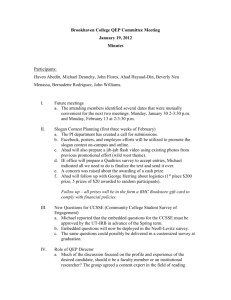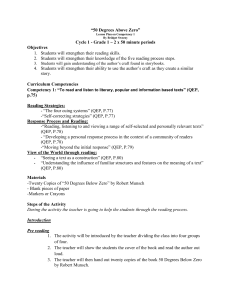After the Quality Enhancement Plan Valerie Osland Paton, PhD Keisha McKenzie, PhD
advertisement
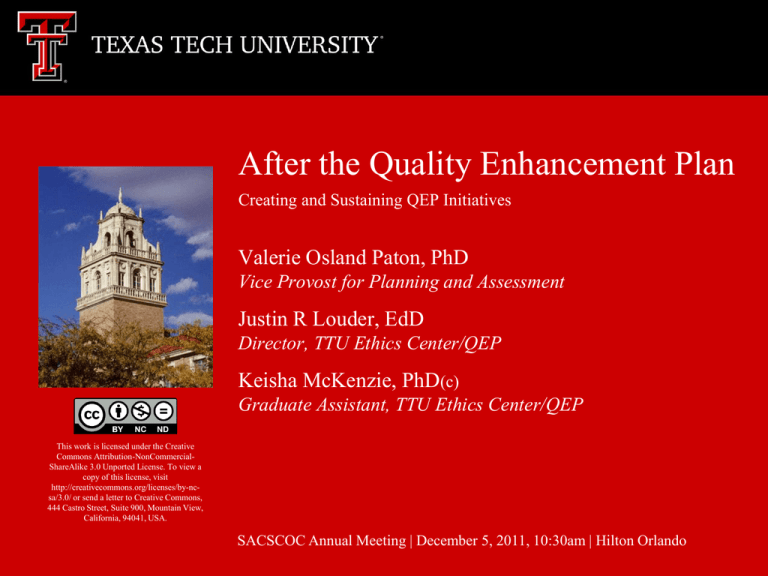
After the Quality Enhancement Plan Creating and Sustaining QEP Initiatives Valerie Osland Paton, PhD Vice Provost for Planning and Assessment Justin R Louder, EdD Director, TTU Ethics Center/QEP Keisha McKenzie, PhD(c) Graduate Assistant, TTU Ethics Center/QEP This work is licensed under the Creative Commons Attribution-NonCommercialShareAlike 3.0 Unported License. To view a copy of this license, visit http://creativecommons.org/licenses/by-ncsa/3.0/ or send a letter to Creative Commons, 444 Castro Street, Suite 900, Mountain View, California, 94041, USA. SACSCOC Annual Meeting | December 5, 2011, 10:30am | Hilton Orlando After the Quality Enhancement Plan Creating and Sustaining QEP Initiatives VALERIE OSLAND PATON, PHD VICE PROVOST FOR PLANNING AND ASSESSMENT JUSTIN R LOUDER, EDD DIRECTOR, TTU ETHICS CENTER/QEP KEISHA MCKENZIE, PHD(C) GRADUATE ASSISTANT, TTU ETHICS CENTER/QEP SACSCOC Annual Meeting | December 5, 2011, 10:30am | Hilton Orlando After the Quality Enhancement Plan Creating and Sustaining QEP Initiatives Initial QEP Design QEP Goals & Intended Outcomes Revised Learning Outcomes Outcomes: TTU Ethical Principles Outcomes: Mission Statement and 2010 Strategic Priorities Outcomes: TTU Ethics Center Circle Talk Questions After the Quality Enhancement Plan Creating and Sustaining QEP Initiatives “Do the Right Thing” A Campus Conversation on Ethics 5-year Institutional QEP A campus survey of faculty, staff, administrators, alumni, and students identified “ethics” as a high-priority theme 4 Initial Areas of Concern • Ethical Institution • Academic Integrity • Ethics in the Curriculum • Diversity and Equity After the Quality Enhancement Plan Creating and Sustaining QEP Initiatives “Do the Right Thing” A Campus Conversation on Ethics Helped students develop personal ethical standards Applied ethical principles to academic situations and real- world concerns Designed to develop an institutional climate that modeled and supported ethical behavior at the university Produced graduates capable of ethical leadership and responsible citizenship within and beyond the university community. After the Quality Enhancement Plan Creating and Sustaining QEP Initiatives Initial QEP Goals Initial Intended Outcomes Goal 1: An Ethical Institution: • Strengthen commitment to ethical behavior at the institutional level, thereby providing a model and inspiration for students. 1. Demonstrate a commitment to high ethical standards 2. Students, faculty, staff, and administrators will adhere to the spirit and letter of institutional ethical policies. Goal 2: Ethics in the Curriculum: • Raise the level of ethical reasoning employed by students and faculty. 1. Establish and maintain an ethical learning environment 2. Students and faculty will identify and analyze ethical problems 3. Students and faculty will demonstrate higher levels of ethical reasoning 4. Students will have greater access to ethics courses After the Quality Enhancement Plan Creating and Sustaining QEP Initiatives Initial QEP Goals Initial Intended Outcomes Goal 3: Academic Integrity: • Strengthen campus culture of academic integrity 1. Students and faculty will demonstrate commitment to the fundamental values of academic integrity 2. The institution will ensure an appropriate and consistent response to academic dishonesty on the part of students and faculty Goal 4: Diversity and Equity*: • Foster an ethical climate that values diversity in its various forms 1. All will have opportunities to interact with people from a variety of backgrounds. 2. All will analyze the ethical implications associated with issues of equity and diversity 3. All will demonstrate commitment to diversity and equity 4. The institution will ensure a welcoming, supportive environment for varying backgrounds. *Texas Tech removed this goal from its QEP on the recommendation of SACS reviewers. A separate sector assumed responsibility for it. After the Quality Enhancement Plan Creating and Sustaining QEP Initiatives Revised QEP Learning Outcomes (2005-2010) 6 institutional learning outcomes • Designed to enhance the campus ethical climate • Facilitated reflection through a conversation among diverse ethical perspectives • Focused on Texas Tech staff, faculty, administrators, and alumni. 9 student learning outcomes • Designed to enhance student competencies regardless of academic major • Developed students’ knowledge of professional codes of ethics • Encouraged students’ academic integrity and critical reasoning skills • Supported students in developing personal ethics and engaging other perspectives After the Quality Enhancement Plan Creating and Sustaining QEP Initiatives TTU Statement of Ethical Principles Adopted in 2008 by the Board of Regents Now the university’s core value statement Used in student debate (2009) and monthly newspaper column After the Quality Enhancement Plan Creating and Sustaining QEP Initiatives University Mission Statement Before QEP University Mission Statement After QEP Committed to teaching and the advancement of knowledge, Texas Tech University, a comprehensive public research university, provides the highest standards of excellence in higher education, fosters intellectual and personal development, and stimulates meaningful research and service to humankind. As a public research university, Texas Tech advances knowledge through innovative and creative teaching, research, and scholarship. The university is dedicated to student success by preparing learners to be ethical leaders for a diverse and globally competitive workforce. The university is committed to enhancing the cultural and economic development of the state, nation, and world. (emphasis added) Approved by the Texas Tech University Board of Regents on May 14, 2010 After the Quality Enhancement Plan Creating and Sustaining QEP Initiatives The 2010-2020 University Strategic Priorities Texas Tech University: Making it possible… Priority 1: Increase Enrollment and Promote Student Success Priority 2: Strengthen Academic Quality and Reputation Priority 3: Expand and Enhance Research and Creative Scholarship Priority 4: Further Outreach and Engagement Priority 5: Increase and Maximize Resources After the Quality Enhancement Plan Creating and Sustaining QEP Initiatives Establishment of the TTU Ethics Center After QEP ended (August 2010), the TTU Ethics Center was established to sustain QEP initiatives. $320,000 annual direct costs Seven staff members (2011) • 2 – 1.0 full-time employees • 2 – 0.5 full-time employees • 2 graduate assistants • 1 work-study undergraduate student Ethics Center Foci: Academic Integrity and Responsible Conduct of Research (RCR) After the Quality Enhancement Plan Creating and Sustaining QEP Initiatives TTU Ethics Center Foci Academic Integrity • Revised Academic Integrity policy and will train campus in Spring 2012 • Promoted through football games, new student orientations, parent and student postcards, and an annual student video challenge • Aligns with TTU Strategic Priority 1 & Strategic Priority 2 Responsible Conduct of Research • Partners with the Office of the VP for Research • Executes mandated NSF training for graduates and post-doctoral students • Conducts monthly lunch series, annual conference, guest speakers, RCR course • Aligns with TTU Strategic Priority 3 & Strategic Priority 4 After the Quality Enhancement Plan Creating and Sustaining QEP Initiatives Circle Talk Self-Reflection and Discussion A well-designed QEP can be transformative because it taps into campus commitments and long-term values. Design your QEP so that it can be sustained. After the Quality Enhancement Plan Creating and Sustaining QEP Initiatives Circle Talk 1. What stage of QEP design or implementation are you at? 2. How are your chosen QEP and your institution’s mission and strategic plan related? 3. What kinds of support do you need to make your QEP more mission-oriented? Structural? Fiscal? Personnel? 4. What impacts do you want the QEP to have on your institution’s mission and faculty, staff, and student work? After the Quality Enhancement Plan Creating and Sustaining QEP Initiatives Questions? After the Quality Enhancement Plan Creating and Sustaining QEP Initiatives Contact Us Valerie Osland Paton, PhD • Vice Provost for Planning and Assessment • valerie.paton@ttu.edu Justin R Louder, EdD • Director, TTU Ethics Center/QEP • justin.louder@ttu.edu | 806-742-1505 | www.ethics.ttu.edu Keisha McKenzie, PhD(c) • Graduate Assistant, TTU Ethics Center/QEP • keisha.mckenzie@ttu.edu | 806-742-1505 | www.ethics.ttu.edu QEP Website: http://www.depts.ttu.edu/provost/qep/
